ELTA, BNS
The Lithuanian parliament fired Center for the Study of the Genocide and Resistance of Residents of Lithuania (Genocide Center) general director Adas Jakubauskas Thursday.
Full story in Lithuanian here.
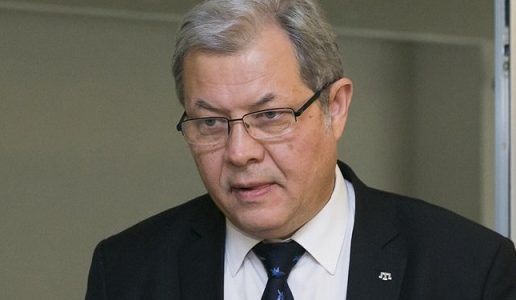
ELTA, BNS
The Lithuanian parliament fired Center for the Study of the Genocide and Resistance of Residents of Lithuania (Genocide Center) general director Adas Jakubauskas Thursday.
Full story in Lithuanian here.
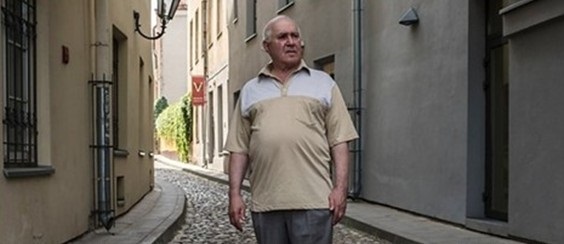
Photo: Pinchos Fridberg, the only Jew left in the Lithuanian capital of Vilnius who was born there before the Nazis invaded in 1941. By Brendan Hoffman for the New York Times.
by professor Pinchos Fridberg, an alter vilner id [an old Jew born and raised in Vilnius]
“Rebe, will there ever come a time when the words Vilne and Yidish will be inseparable again?”
“Saydn nor mit Meshiakh’n ineinem.” [Not unless it comes with the Messiah.]
Introduction
The article “Как это делалось ин Вилнэ…” [This Is How It Was Done in Vilne] became the main feature for issue no. 505 of the international magazine “Мы Здесь” [We Are Here] in 2015. More than 7,000 people read it, and I began receiving letters from people whom I didn’t know.
The largest Russian-language weekly newspaper in Lithuania “Обзор” [Review] reprinted this article on its website on March 8, 2021.
The article concerns the history of Jewish Vilnius.
I think it might be interesting to non-Russian-language readers as well. *
“This is How It Was Done in Vilne…”
As I was putting my archive in order, I came across a small program for a concert to celebrate the 10th anniversary of the Jewish volunteer collectives. This program is more than half a calendrical century old. I think the reader might be interested to see “how it was done in Vilne.” The program contains over 30 photographs. I will present a few of them. I believe it has long been time for them to be revived on the wider internet.
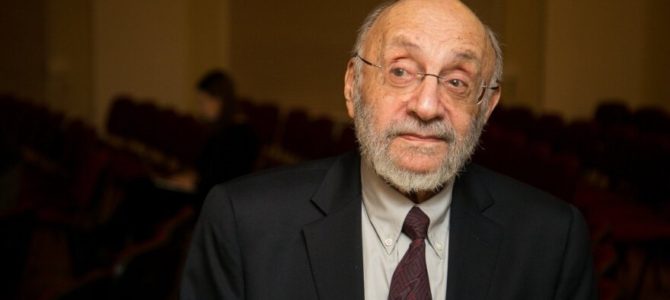
www.DELFI.lt
The Vilnius Gaon Jewish History Museum and the EZCO creative agency are presenting an initiative called “Art Creates Tolerance” inspired by the life and work of Samuel Bak.
The project’s goal is to use Vilnius-born Holocaust survivor Samuel Bak’s art “to encourage public discussion using modern multimedia on the past and socially-sensitive issues of the present, to find historical signs and to discover the value of tolerance,” according to museum director Kamilė Rupeikaitė.
The project will use the museum’s existing physical and virtual exhibits about Bak and expand them with new exhibits.
Full story in Lithuanian here.
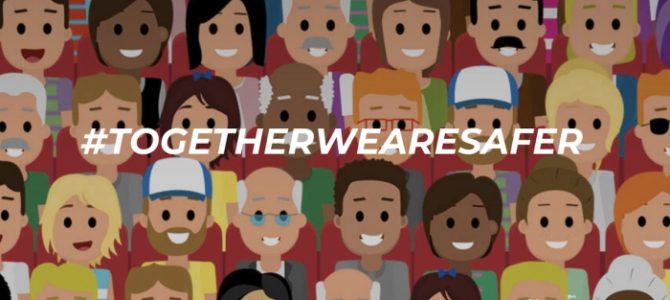
Dear Presidents,
Dear Friends,
For the last few years, one of SACC to the EJC’s objectives has been to increase its cooperation with the European institutions to enhance security, support and preparedness for our communities.
The European Council Declaration of 6 December 2018 on the fight against anti-Semitism underlined that the security of Jewish people is an immediate necessity and requires timely action.
Our engagement with the European Commission, in particular at the Working Group for the Protection of Public Spaces, has strengthened our belief in the importance of working together with other communities and finding synergies in the fight against hatred and terror.
Helping other communities with the security challenges that they face is of course in line with Jewish core values and with our mission.
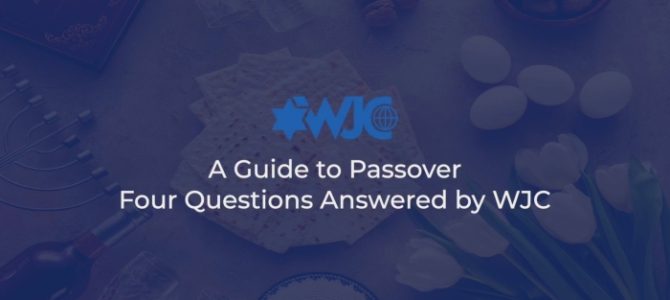
A time to reflect, learn and continue to fight for justice, freedom and rule of law
Katharina von Schnurbein, coordinator on combating anti-Semitism and fostering Jewish life, endorsing the tradition of asking questions in a video guide to Passover produced by the World Jewish Congress (WJC), reflects on the following:
“It’s been thousands of years since Moses led the Jews out of Egypt, yet Jews still read the story of this miracle each year. What can the world learn from the story of Passover in 2021?”
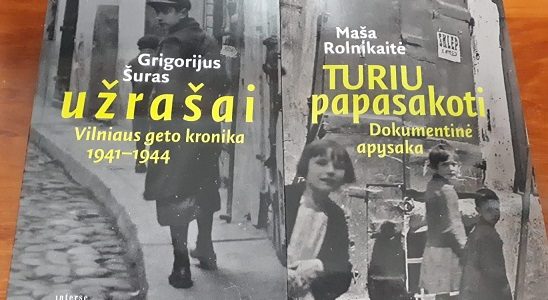
by Eugenijus Bunka
When you speak with those who aren’t there, it’s called Memory. Therefore Maša Rolnikaitė’s book “I Must Tell” [Turiu papasakoti] and Grigoriy Shur’s “Entries: Chronicle of the Vilnius Ghetto, 1941-1944” [Užrašai: Vilniaus geto kronika 1941-1944 m.] are books of Memory. And in memory of those whose lives were cut short, as they began or half-way through, who were consumed in the flames of the Holocaust.
Not one of the people mentioned in these books died a natural death. That inherent human right was taken from them.
They died without notice in World War II, but Maša and Grigoriy who had stood with them spoke loudly.
If a Red Army soldier hadn’t found Maša frozen, lying in a snow drift on the final death march from the Stutthof concentration camp, this book would not exist. The diary she kept hidden on her person would have been buried with her. But she survived and now in eighteen languages her story tells the world what humanity may never allow to happen again.

Lrytas.lt
“On Friday the working group adopted a conclusion proposing the parliamentary leadership ask the parliament to consider whether Adas Jakubauskas is the appropriate person to hold the post of general director of the Center for the Study of the Genocide and Resistance of Residents of Lithuania,” working group director MP Radvilė Morkūnaitė-Mikulėnienė told BNS.
Six members voted in favor and one against this conclusion. Radvilė Morkūnaitė-Mikulėnienė said everyone was interested in seeing a strong Genocide Center which would operate smoothly and represent the interests of the Lithuanian state.
“… It has become clear A. Jakubauskas has not been successful in insuring the smooth operation of the institution,” she said. “The director of the Center has not been successful in solving arising problems in a constructive manner. The method of operation selected has only increased stress and conflict within the center he directs. Also, the constant public reports about the situation in the Center diminishes the exemplary reputation of this institution.”
Peasants Party MP Jonas Jarutis voted against the finding, saying he was disappointed other members of the working group had taken the easy way out.
Over a dozen historians and academics staged a protest Friday outside the Genocide Center in Vilnius. They said they wanted to show support for historian Mingailė Jurkutė who was terminated. She also took part in the protest. Protestors also said they wanted to bring attention to Center director Jakubauskas’s attempts to restrict freedom of speech and inquiry.
The leadership of parliament, that institution’s nominal board of directors composed of the heads of major factions there, could initiate Jakubauskas’s removal from the post of general director, as could a parliamentary committee, or a call by MPs with one-fifth voting for this.
Full story in Lithuanian here.
.
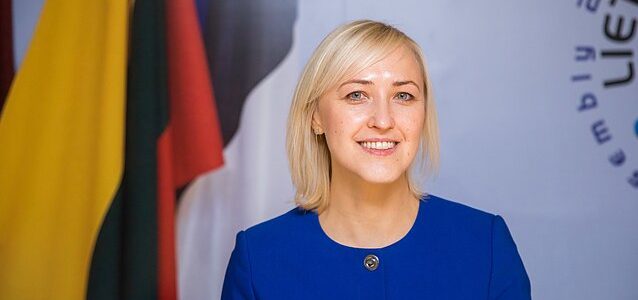
Member of parliament Paulė Kuzmickienė has been chosen to succeed Valdas Rakutis as chairwoman of the Lithuanian parliament’s Commission on Battles for Freedom and State Historical Memory. Paulė Kuzmickienė is a member of the Conservative Party/Lithuanian Christian Democratic Party faction in parliament. Fourteen members of the Commission voted in favor of her, one against and one abstained Wednesday. The move must still be approved by the parliament.
Outgoing chairman Valdas Rakutis resigned the post in late January after causing scandal with his remarks on the Holocaust. On International Holocaust Remembrance Day he published an article saying Jews had collaborated with the Nazis and Soviets. His statements were criticized by the Lithuanian Jewish Community, foreign diplomats and leaders in the Lithuanian Christian Democratic Party.
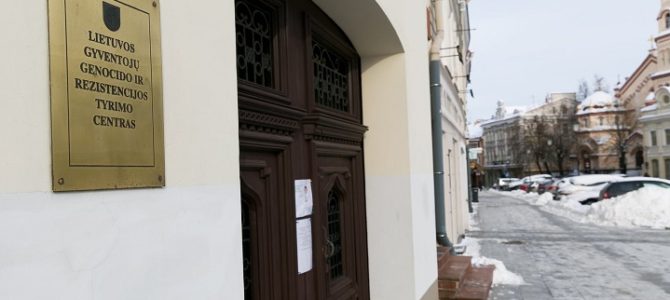
Lrytas.lt
Radvilės Morkūnaitė-Mikulėnienė, head of the Lithuanian parliamentary working group convened to inquire into problems at the Center for the Study of the Genocide and Resistance of Residents of Lithuania, says while MPs hold different opinions regarding the state history institution, they were unanimous in the finding dialogue won’t bridge the divide between the Genocide Center’s leadership and some of its staff.
The working group plans to release their findings Friday.
“We decided to make a final decision Friday morning. The views of commission members are somewhat at odds, but basically everyone who spoke said the Center is experiencing problems and it doesn’t appear there is a desire to come to terms,” Morkūnaitė-Mikulėnienė told ELTA Wednesday.
She pointed to the Center’s leadership as the main culprits, saying that became clear when general director Adas Jakubauskas fired historian Mingailė Jurkutė.
Full story in Lithuanian here.
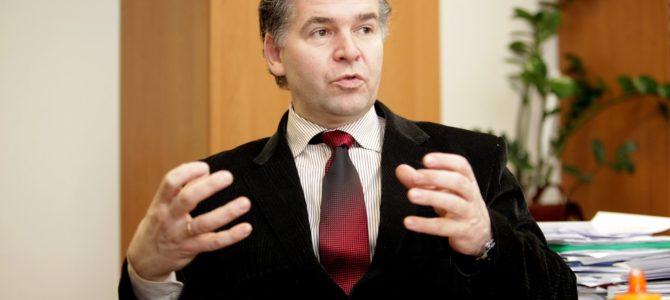
Photo: Valdas Rakutis
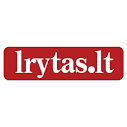
Lrytas.lt
The gas chamber was a “very humane” method for exterminating Jews in the Holocaust. Conservative member of the Lithuanian parliament Valdas Rakutis issued this and similar statements in writing in academic discussions two decades ago, the Lithuanian newspaper Lietuvos rytas reports.
Does the MP, who just recently resigned his chairmanship of a parliamentary commission because of controversial and scandalous statements about the Holocaust, think differently now? Even though he resigned, he said he hadn’t said anything wrong and hadn’t wanted to, and was forced to remove himself by the party leadership.
Rakutis, a qualified historian who actually still is at least formally the chairman of the parliament’s Commission on Battles for Freedom and State Historical Memory, hasn’t renounced these opinions expressed earlier. He said Jews were murdered in the gas chambers with less physical suffering than when they were tortured and shot to death, so his statement was correct. He qualifies this by saying this is true if you could compare things “in whole.”
Special Lesson for Soldiers
Rakutis made this shocking statement in his own writing when he was a teacher at the General Jonas Žemaitis Military Academy teaching young Lithuanian soldiers. That was back in 2000 and 2001 when the academy and society beyond was involved in heated and impassioned discussions on whether to include a lesson about the Holocaust in its educational curriculum for soldiers.
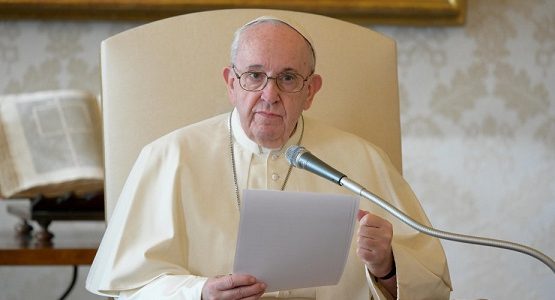
NEW YORK–Today Pope Francis made a Shabbat visit to Edith Bruck, an 89-year-old Hungarian-born Holocaust survivor, at her home in Rome.
“I have come here to thank you for your testimony and to pay homage to the people martyred by the insanity of Nazi populism,” the Pope told her, according to the Vatican.
World Jewish Congress president Ronald S. Lauder applauded the Pope:
“I am deeply appreciative of Pope Francis’s tremendous compassion in visiting Edith Bruck who survived the horror of several Nazi concentration camps, lost her family who were murdered in the Holocaust and has bravely shared her story. The Pope has demonstrated a sincere commitment to both personal kindness for the experiences of others and to the urgency of continuing to draw attention to the inhuman atrocities of genocides including the Holocaust. At a time when neo-Naziism, anti-Semitism and other bigotries are resurgent in many parts of the world, Pope Francis’s moral integrity and sense of history set the standard for other faith, political and community leaders to follow.
“My gratitude goes as well to Mrs. Bruck for her courage in telling the world about her trauma and in dedicating her life to educating people about the horrible truths of the Holocaust. As survivors age, their testimonies become increasingly priceless, and we owe our understanding of the very worst of humankind to the individuals who have taken it upon themselves to bear witness to all they have endured. Through such comprehension, we pray that such evil shall never happen again.”
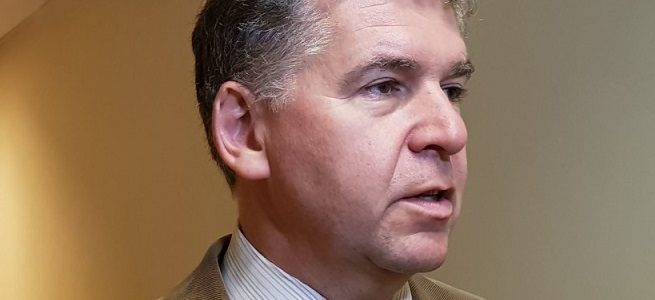
The prosecutor at the Vilnius District Office of Prosecutor has decided not to begin a pre-trial investigation of statements made by member of parliament Valdas Rakutis in his article “International Holocaust Day and Historical Memory.” The prosecutor said the decision was made based on the lack of an act of a criminal nature, a press release said.
The decision not to initiate a pre-trial investigation was made following a statement from the chairwoman of the Lithuanian Jewish Community which indicated historian and MP Rakutis published the article on International Holocaust Remembrance Day on an internet site which allegedly incited hatred against Jews and their people, and possibly engaged in Holocaust denial.
The informant asked the prosecutor to consider whether or not the statements made in the article constituted the criminal act defined in article 170, part 2 of the Lithuanian criminal code, “incitement against any national, racial, ethnic, religious or other kind of group of people,” and article 170-2, part 1, “public approval for international crimes, crimes committed by the USSR and Nazi Germany against the Republic of Lithuania or residents thereof, and their denial or gross trivialization.”
The decision to decline beginning a pre-trial investigation stated the criminal acts defined in article 170, part 2, and article 170-2, part 1, can only be committed by direct intention.

by professor Rimvydas Petrauskas, rector, Vilnius University, for DELFI.lt
Recent discussions on the topic of historical memory and policy have brought to the fore the issue of the role the professional historian plays in shaping the public’s historical memory. This text is about history, historians, historical memory and the historian’s mission.
History and Historians
The noted French historian Jacques Le Goff who died a few years ago spoke about the relationship between history and the present, soberly saying history can at one and the same time be that which connects, and that which afflicts. It can be utilized for the most different ends, to encourage healthy patriotism and to justify the annexation of another country, and those are just two of the more extreme poles. At the same time, Le Goff explained, the discipline of histry should help people live their lives and in communal life, help them navigate between a rich legacy of the past and what is sometimes a dangerous nostalgia.
He knew what he was talking about. In 1942 his teacher Marc Bloch, founder of the Annales School of French social history, had lost his job, books and some of his old friends in occupied France, but authored what is probably the most optimistic explanation of history ever, calling for seeking out historical truth in the face of historical tragedy. This member of the French Resistance was shot two years later by the Nazis.
Full text in Lithuanian here.
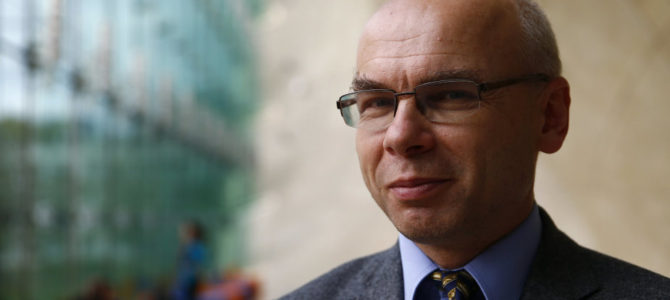
15min.lt

Historian Dariusz Stola says there is a campaign underway in Poland to frighten historians who speak about Holocaust crimes committed by Poles. The result, he says, is invisible: books and articles which are never written. Stola says 10 years ago he was sure it would only get easier to talk about these complex historical events as time passed. Now something has changed, and it might be related to the growth of social media.
Stola is a professor of history at the Polish Academy of Sciences and served earlier as the director of Poland’s Jewish History Museum POLIN.
After five years directing POLIN Stola submitted an application to be rehired and received 11 of 15 votes by judges on the hiring commission, but the Polish minister of culture refused to appoint him director again.
We caught up with Stola a few days after a Polish court ordered two of the country’s leading historians to apologize to the niece of a village alderman who claimed Polish historians Barbara Engelking and Jan Grobowski libeled her relative in the monograph they coauthored where they wrote he was an accomplice in the mass murder of Jews.
Indirect Government Intervention
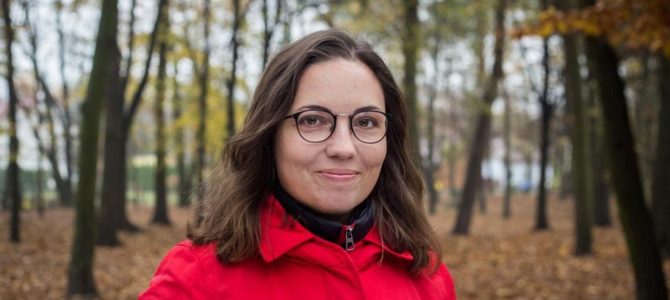
Katarzyna Markusz was questioned on suspicion of violating a law against defaming the country after an anonymous complaint about an article from 2020. She faces up to 3 years in jail.
Polish police are probing a local journalist who wrote last year about Polish complicity in the Holocaust.
Katarzyna Markusz, who runs the Jewish.pl website and writes for the Jewish Telegraphic Agency, was questioned last Thursday on suspicion that she violated Article 133 of the Polish constitution, which subjects those who “publicly insults the Nation or the Republic of Poland” to up to three years in prison.
An anonymous complaint was filed against Markusz, which led to her detention and interrogation, according to Oko.press.
In October, 2020, Markusz wrote in an article: “Will we live to see the day when the Polish authorities also admit that hostility toward Jews was widespread among Poles, and that Polish complicity in the Holocaust is a historical fact?
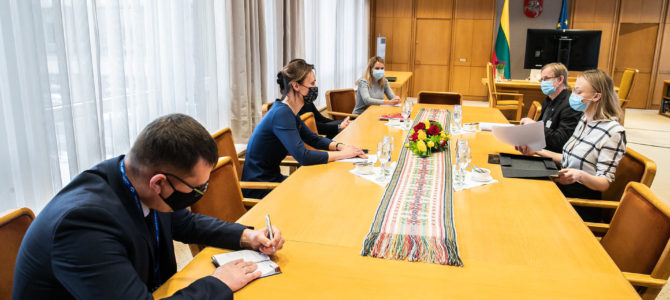
by Mingailė Jurkutė, chief historian, Center for the Study of the Genocide and Resistance of Residents of Lithuania
The current director of the Genocide Center is trying to give the impression all that is happening are just internal department disputes, depot against depot, one faction of historians against another, or maybe historians vs. museum specialists, or maybe even brave, ambitious and mobile visionaries of the new administration against the academics at a small bureaucratic institution who long for stagnation and a light work-load. This is a terrific and naked lie.
Center historians are productive and their academic production and other specific Center production, for example, writing brief–barely two pages long–and exact findings of history, which often require examining just as much material as for an article in the normal academic format. And they want reform, they are proposing reforms themselves. This story is a very successful technique when you want misconstrue and hide what is going on, for example, as Soviet ideologues went to extremes to explain the partisan war was really a class war, or a civil war, and in any case… an internal social dispute.
But I want to return the real players (the sides) to center stage, because they are getting lost due to the noise, agitation and intentional mud-slinging (of which an example is the letter the administration drafted to defend the administration, not without pressure from direct bosses to staff to sign on in telephone calls made outside working hours, forcing employees to arrive in person at the workplace to sign in the midst of the pandemic).
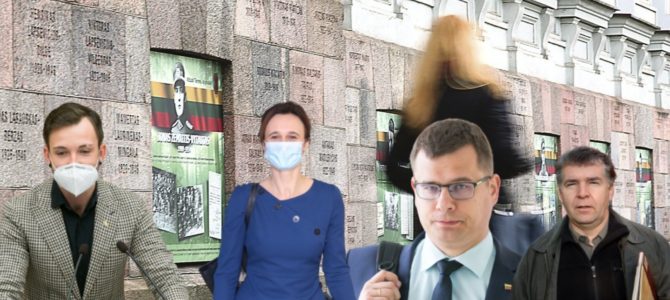
by Vytautas Bruveris, Lietuvos rytas
Even representatives of different camps within the ruling majority are set to cross swords. This war of positions will come to the fore in parliament because of the activities of the Center for the Study of the Genocide and Resistance of Residents of Lithuania currently besieged by scandal.
Tomas Raskevičius, chairman of the Lithuanian parliament’s Human Rights Committee and a member of the ruling Freedom Party, believes the Office of State Auditor needs to thoroughly investigate the Genocide Center and says there could be many different problems there.
The Human Rights Committee exercises parliamentary supervision of the Genocide Center, but the Lithuanian parliament’s National Security and Defense Committee chaired by conservative Laurynas Kasčiūnas has taken the reins over the Center into its own hands. Further, a special working group empaneled by parliamentary speaker Viktorija Čmilytė-Nielsen is set to begin investigating the activities of the Genocide Center, a working group which will also feature a diversity of opinions.
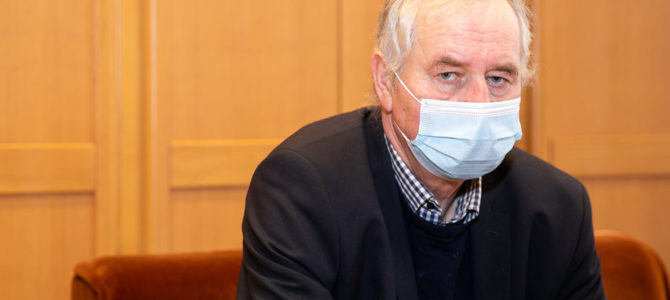
15min.lt

Speaker of Lithuanian parliament Viktorija Čmilytė-Nielsen met representatives Tuesday of universities and the Lithuanian History Institute to discuss the situation at Lithuania’s Genocide Center, following a boycott of Genocide Center announced by these institutions. Lithuanian History Institute director Alvydas Nikžentaitis said the problem is not just a domestic one and needs a final solution.
Historians from Vilnius University, Vytautas Magnus University, Klaipėda University and the Lithuanian History Institute sent the speaker a letter complaining the new leadership of Genocide Center under Adas Jakubauskas after he was appointed in February of 2020 had led to a primitive politicization of sensitive and painful events of the past without taking sources into account. They said they could no longer work with Genocide Center under those conditions, and didn’t agree with unprofessional statements made by representatives of the Genocide Center.
Nikžentaitis said there had been indications very long before Jakubauskas’s appointment that things weren’t right at the Center, and that his colleagues had made numerous complaints. Nikžentaitis said some of them were even persecuted for expressing their opinion regarding the Center. Nikžentaitis listed among other complaints that there were allegedly discussions inside Genocide Center that if the current director of the Center’s Department of Historical Research [Arūnas Bubnys] withdrew from the post, he would be given a different post, while behind the scenes agreement was reached on replacing him with another person more obedient to the leadership.
“So basically this was preparing the ground, let’s say, for preparing opinions very far from academic at the Center, so that the Center would be ready to carry out specific propaganda goals,” Nikžentaitis said.
On the meeting with the speaker of parliament, Nikžentaitis said they discussed how to change the existing situation. He added that in a certain sense the problems at Genocide Center were pre-programmed from its very inception.
Full article in Lithuanian here.
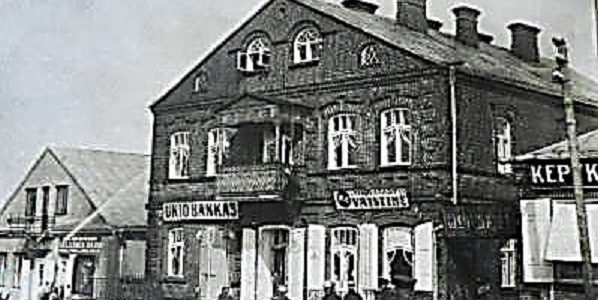
Photo: Just a few buildings witnessing to the Jewish past still stand in Utena.
Translated to Lithuanian by Vytautas Ridikas from Massacres in Utena by Tsozdik Bleiman writing in Russian
§§§
As the only living witness left, I am able to share some special memories.
My father Jakov Bleiman, who was formerly a rabbi in Crimea, performed the same duties in Utena, where my brother-in-law Efraim Yudelovich also lived with the family. At the beginning of the war I lived in Kaunas.
I decided to see my parents and then, if the right conditions were in place, to evacuate with the entire family. As it turned out there was no way to leave for somewhere, because just as I arrived in the city the Germans entered. Our fate became clear: we were all condemned to death.
Thursday. The first day of the German regime. Dozens of Jews are herded to work, led to the Germans and their Lithuanian helpers. The work is meaningless and insignificant, just in order to deride the Jews, sending them around all day with brooms, shovels and other implements.
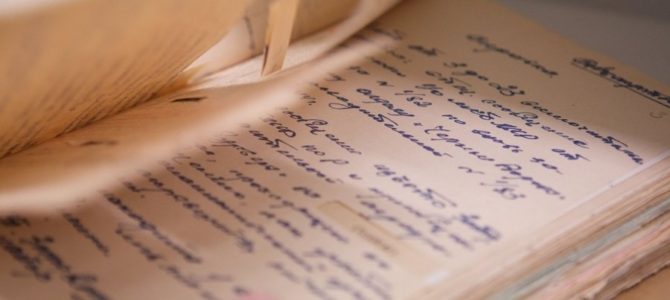
The Lithuanian media report several stories related to recent internal dissent and the resignation of Vidmantas Valiušaitis at the Center for the Study of the Genocide and Resistance of Residents of Lithuania, usually called the Genocide Center, a state-financed arbiter of the official Lithuanian version of history.
Delfi.lt reported Lithuanian speaker of parliament Viktorija Čmilytė-Nielsen said it was too early to talk of replacing Genocide Center’s recently-appointed director Adas Jakubauskas, but called the problems there real, and said she thought a parliamentary commission should be formed to look into complaints which came to light last week when staff historians at the state institution published an open letter issued as an appeal to the speaker of parliament, complaining history was being politicized under the current director, see https://www.delfi.lt/news/daily/lithuania/cmilyte-nielsen-kelti-genocido-centro-vadovybes-kaitos-klausima-tikrai-per-anksti.d?id=86384653 for the complete story in Lithuanian. Long-time observers note the Genocide Center has always been politicized and that is its main mission as defined in law, to present a politicized version of history.
Delfi.lt also carried an in-depth account of a discussion held last week on Lithuania’s Žinių Radijas talk radio station between Vytautas Bruveris, a writer and journalist who has won much public respect for his reporting and editorials over the years at Lithuania’s Lietuvos rytas newspaper, and Vidmantas Valiušaitis, a writer with an ultra-nationalist view of Lithuanian history who has worked as a newspaper writer and whose work has been featured in the official magazine of the Lithuanian military, Karys. Valiušaitis’s appointment to a post created especially for him by the new director of Genocide Center was one of the main complaints in the appeal staff and historians sent to the speaker of parliament. The text in Lithuanian can be found here: